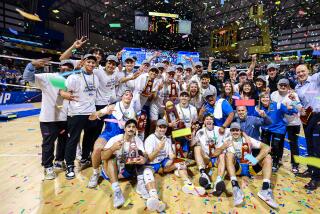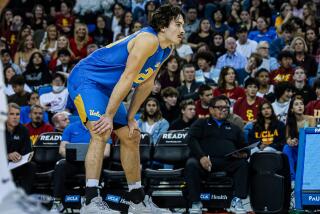Graham Finally Learns to Play the Numbers at Stanford
- Share via
During her first season as a Stanford tennis player, Debbie Graham wasn’t sure if she needed to brush up on her ground strokes or on her math.
She spent half her freshman season ranked No. 1 in the nation. She spent all of it undefeated in dual matches.
And she spent nearly all her patience trying to figure out why she was playing No. 4 singles at Stanford.
“I was confused,” Graham says. “It didn’t make any sense to me. I thought, ‘How could this be happening?’ ”
Easy. During her sophomore season, Graham went undefeated in dual matches again, extending her winning streak to 52, an NCAA record.
That moved her up to No. 3 singles.
At Stanford, even when she sat down for lunch, Graham was no better than No. 2. Her closest friend on campus, Sandra Birch, was also her longtime doubles partner, a Stanford junior, a Cardinal teammate--and 1989 NCAA Women’s singles champion.
That’s the beauty, and the bane, of playing tennis in Palo Alto. Some universities collect the papers of major statesmen and scholars. Stanford collects major tennis players. How do you define depth? Two years ago, Lisa Green played No. 1 singles for the Cardinal during the NCAA team playoffs. This year, she played No. 5.
But Graham is a native Californian who attended La Quinta and Los Amigos high schools and still resides in Fountain Valley. She’s accustomed to sunshine. Life in the shadows isn’t good for your tan and even worse for your disposition.
“It’s so easy to get lost when you’re playing No. 3 or No. 4,” Graham says. “No one pays attention to the No. 3 and 4 players. Stanford has a great team for a reason, and I wanted people to know that it’s more than just one or two players.”
So on Thursday, Graham did something about it.
On Thursday, Graham won the NCAA singles championship.
That’s one way to climb the Stanford tennis ladder.
“There was a lot I wanted to prove in the NCAAs,” Graham says. “After having been here for two years, after coming in as the (top-ranked) recruit in the nation and after getting stuck at No. 4 when I thought I should be playing higher, it was a blow to me. I thought I was better than some of the players ahead of me. I beat some of the players ahead of me.
“But I figured that I was the freshman and Coach (Frank) Brennan thought it was best for the team to put me there. This year I thought would be different. This year I came in thinking, ‘Well, last year I was freshman and I deserved to play there and now I’ve paid my dues.’ ”
This year, Meredith McGrath played No. 1 singles for Stanford. McGrath is a freshman.
Graham noticed.
“Meredith came in,” Graham says, “and everyone thought she was the hottest thing. When people talked about Stanford, it was always Sandra Birch and Meredith, the top freshman in the country with a high (world) ranking.
“We hold challenge matches in January and I beat Meredith in a challenge match, but it didn’t mean anything. She still played No. 1 and I played No. 3.”
Graham played No. 1 in the NCAA tournament, defeating Florida’s Nicole Arendt in a 6-3, 6-3 final, but to get there, Graham first had to pass a philosophy test she had always failed: Can you beat a friend and still be friends?
In both the Pacific 10 championships at Ojai and the NCAA championships, Birch faced Graham in the semifinals.
“I’d never beaten her until we played in Ojai,” Graham says. “She’s my best friend coming into school, we’ve played doubles forever. It was always difficult for me to play her. I’d try to be nice to her. I didn’t want to beat her because she was my friend.
“Sandra was different. When she played me, she turned into a competitor. She treated me like an enemy, in a way. And she’d beat me.
“My parents would get so frustrated. They knew I was as good as her, but when I played her, I was like a zombie out there.”
At Ojai, Graham finally learned. “If she treats me just like another opponent, I have to block out the friendship,” Graham says. And she did, beating Birch--and later, McGrath in the final--to win the Pac-10 title.
That got Graham to thinking.
“If I can beat the No. 2 and No. 1 players in the country, gosh, I can beat anyone,” she said.
It was a winning way to approach her second NCAA tournament. McGrath did a favor by losing early, but Birch qualified again for the semifinals. There, the rematch resulted in a rerun and Graham was poised to replace her friend as defending national champion.
Finally, there was match point against Arendt.
“I seriously could not believe it,” Graham says with a laugh. “At the awards presentation, I couldn’t think of anything to say. I was so exhausted and so excited, when they asked me to say a few things to the crowd, I didn’t have any words.”
With Stanford also winning the team championship, Graham had a chance to become the first woman to sweep all three NCAA titles. All she needed was to win one more doubles match with Birch. But in an all-Cardinal final, McGrath and Teri Whitlinger rallied for a 4-6, 7-5, 6-2 victory.
“Those little records are neat,” Graham says, “but I wasn’t even aware of it until after the fact. Maybe that’s something to look forward to in the future.”
There’s always next year. Graham says she’s coming back for her junior season, so a new day awaits at Stanford, along with a new round of challenge matches and a new tennis ladder.
Maybe then, they’ll bump her up to No. 2.
More to Read
Go beyond the scoreboard
Get the latest on L.A.'s teams in the daily Sports Report newsletter.
You may occasionally receive promotional content from the Los Angeles Times.










